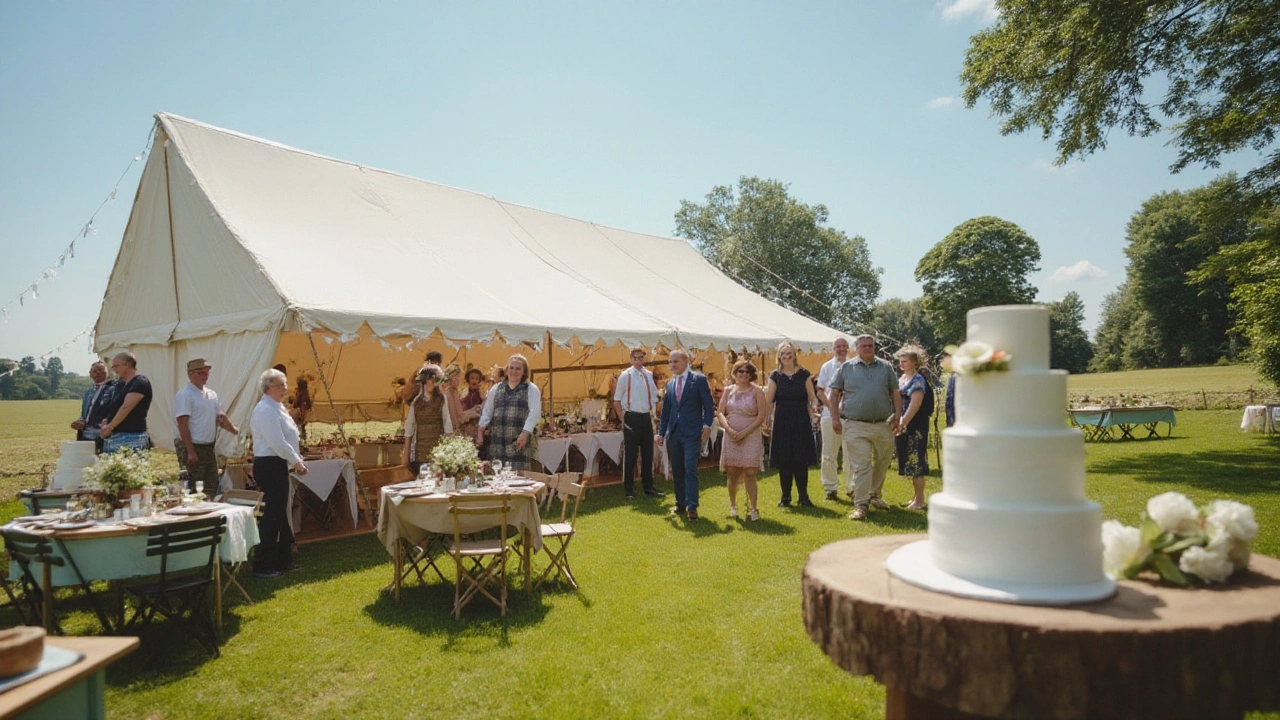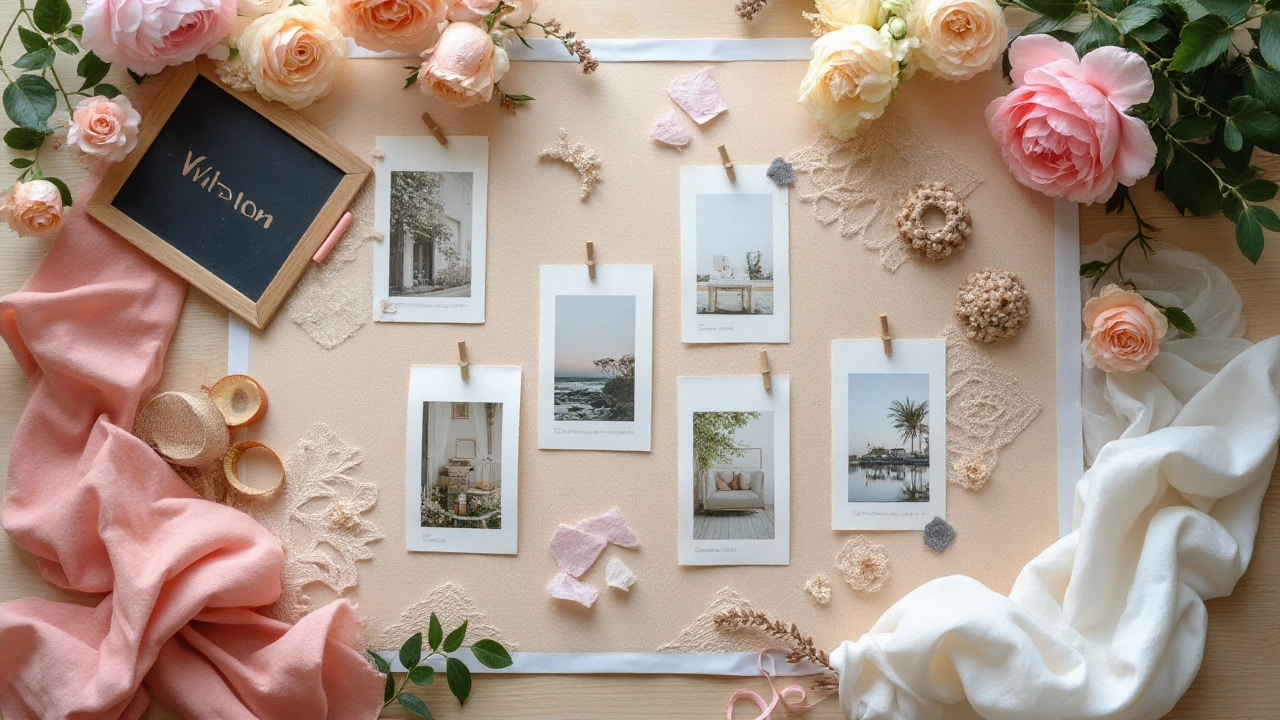Smart Wedding Budgeting for 100 Guests: Tips & Tricks
 Jan, 23 2025
Jan, 23 2025
Planning a wedding is a joyous yet challenging task, especially when you're striving to host a memorable event for 100 guests. As you embark on this exciting journey, establishing a budget that caters to your needs is essential. With countless options for decorations and services, it's crucial to make choices that reflect your style without breaking the bank.
When delving into wedding budgets, understanding where your money goes can make all the difference. Decorations play a pivotal role in crafting the ambiance, setting the mood, and expressing your unique vision. Whether you seek timeless elegance or whimsical charm, a thoughtful allocation of resources can bring your dreams to life.
Join us as we explore the ins and outs of wedding budgeting, revealing insights and tips to transform your celebration into a stunning success. From prioritizing key elements to uncovering creative solutions, we guide you through the intricacies of crafting a budget-conscious yet enchanting wedding experience.
- Understanding Wedding Budgets
- Prioritizing Your Expenses
- Creative Decoration Ideas
- Cost-Saving Tips
- DIY vs Professional Services
- Finalizing Your Budget
Understanding Wedding Budgets
The foundation of any successful wedding planning is a well-structured budget, designed to align your dreams with your financial realities. Begin with a clear overview of your total funds, whether they come from savings, family contributions, or crafty financial planning. Aligning your dream wedding's aesthetics and logistics within a set budget requires meticulous planning and an understanding of core expenses. When planning for 100 guests, it is helpful to allocate funds to accommodate varying costs, such as venue, catering, and especially wedding decorations.
Industry insights suggest that couples often allocate around 40% of their budget for the reception, including venue rentals, food, and drink. The remaining funds typically cover attire, photography, flowers, music, and finally, the decor element which leaves a lasting impression on both the couple and guests alike. With decorations, creativity can be paramount to adapting financially feasible yet beautiful options that reflect your style. From subtle, minimalist touches to vibrant, immersive decor, the choice is vast and captivating if planned wisely.
"A budget isn’t about restricting your spending it's about freeing up your money to spend on the things you truly love," says Tiffany Aliche, a renowned financial educator known as 'The Budgetnista.'
When crafting a sensible wedding budget, it proves beneficial to take a phased approach. Start by listing potential expenses, assigning a preliminary figure to each area from your estimated totals. Include a buffer for unexpected costs; weddings tend to unveil unseen expenses, necessitating flexibility. Piece together puzzle pieces of your vision as you tally costs, introducing creativity for any added grandeur without impacting financial planning too harshly. To monitor expenses effectively, many couples find breaking down their budget into a detailed expense tracker or spreadsheet extremely advantageous.
A 2019 report from The Knot, representing over 27,000 weddings, provided insight into average spending habits in the U.S. Based on this data, the average wedding cost was around $33,900, with couples typically allocating 8% of their total budget on decorations. For a wedding with 100 guests, planners suggest factoring approximately $250 to $400 per guest into your calculations for major costs, providing a rough framework to outline expenses appropriately. Although regional variances exist, such benchmarks are a useful guideline.
Remember, your budget is a roadmap leading to a day of unforgettable moments with those you hold dear. It provides peace of mind and clarity so that when your special day approaches, you are prepared to focus on what truly matters. The best wedding budgets transform plans into reality, offering breathtaking decor and robust festivities without compromising your financial future.
Prioritizing Your Expenses
Embarking on the adventure of planning a wedding starts with setting priorities. Begin by identifying the elements of your wedding that are non-negotiable. Whether it's the venue, catering, or decorations, understanding what's most important to you will guide your budgeting decisions. Couples often find that their top priority is the venue, as it sets the scene for all the festivities. Some prefer the idea of a lavish banquet hall, while others might opt for a rustic barn setting, which could influence costs significantly. Allocating more of your wedding budget to high-impact areas ensures a quality experience for you and your guests, making the day memorable.
Next, consider the aspects that can be adapted or reduced in spending without losing the essence of your celebration. For instance, choosing simpler centerpieces or limiting the open bar selection can lessen financial strain without detracting from the overall experience. Wedding decorations often offer opportunities to save by focusing on impactful pieces rather than a large quantity of small items. Creative, personal touches can add charm without excessive expense. As Mark Twain said, "The secret of getting ahead is getting started," so take that first step in understanding and ranking your desires.
Another key strategy is distinguishing between essential and supplementary services. Professional photography might be essential, ensuring those special moments are captured eloquently, while opting for a simple or even digital invitation can trim costs. Consider what guests will remember: a heartfelt ceremony, delicious food, and the company of loved ones. Charting out what brings the most joy and planning your budget around those highlights can maintain quality without unnecessary expenditures. According to The Knot's 2023 wedding survey, florals represented 8-10% of most couples' costs, suggesting room for adjustment if needed.
A wedding planner once shared that 'budgeting isn't about limiting yourself – it's making the best decisions for the incredible life you're about to embark on.' This wisdom highlights the essence of smart wedding planning, turning financial constraints into a tool for discovering creative solutions. Relishing the process of decision-making allows couples to infuse their celebration with personal values and vision, reflecting their unique journey as a couple.
Finally, consider embracing DIY projects. You might surprise yourself with what you can accomplish. Channeling creativity into creating decorations or designing your playlist offers an intimate touch, turning financial prudence into artistry. Try forming a wedding workshop day with friends and family, transforming it into a bonding experience that spreads joy beyond the financial savings. The act of collectively contributing to your special day can turn budgeting into an adventure, drawing loved ones closer in the process.

Creative Decoration Ideas
When planning a wedding for 100 guests, there's no reason to compromise on style, even if you're working within a tight budget. Decorations set the tone, transforming any venue into the perfect backdrop for your special day. Embracing creativity can lead to striking décor without spending a fortune. Start by thinking outside the box and consider using repurposed items or second-hand treasures. Scouring thrift stores or online marketplaces might reveal unexpected gems that can add charm and elegance to your event. It's also about weaving in personal touches that hold sentimental value and reflect the essence of the couple. Think about using photos from your journey or decor items that tell your story.
Another crucial element of wedding decorations is choosing a color palette that resonates with your theme. Simplifying your choice to three to four hues can create visual harmony and make your planning process smoother. Consider incorporating seasonal hues; for example, pastels work well for a spring wedding, while rich, deep tones can add warmth to a fall celebration. Strategically placed flowers can do wonders for any space. If fresh blooms strain your budget, fake flowers or greenery can be just as effective. Styles like bohemian or rustic work exceptionally well with faux elements, lending beauty through texture and repetition.
Certain décor elements can dramatically affect the perception of your entire venue. Lighting is one such powerful aspect. Fairy lights, lanterns, and candles can establish an enchanting ambiance, turning any area into a romantic hideaway. According to architect and designer Gabriella Wilkins, lighting is the cornerstone of creating atmosphere.
"Lighting isn't just about visibility—it's about creating an atmosphere that resonates with the emotions you want your guests to feel," says Wilkins.You could also consider renting lighting fixtures from wedding suppliers if purchasing doesn't fit your budget. And never underestimate the charm of candles; their soft glow can be both alluring and affordable.
Utilizing technology and sleek design in your wedding setup can be another way of amplifying the customer experience. Digital signage displaying multimedia elements offers an effortless way to captivate your attendees. It serves both aesthetic and functional purposes, smoothly fitting into the modern-day wedding vibe. Additionally, incorporating eco-friendly and sustainable elements can make your wedding decorations both beautiful and ethical. Recyclable materials such as glass jars for centerpieces or fabric banners instead of paper can provide a striking yet environmentally conscious touch to your decorations.
Creative decoration options extend to table setups, too. Tablescapes can be greatly enhanced with borrowed or familial heirlooms, such as antique candlesticks, that bring a revered grace to the setting. Get crafty with DIY table numbers and name cards which can double as lovely guest favors—a simple touch that guests will appreciate. Remember, the success lies not in extravagance but in details that capture attention and convey love.
In summary, setting the scene at a beautifully styled wedding without overspending is absolutely achievable. It's about leveraging creativity and resourcefulness while channeling your unique love story. The magic unfolds when the love shared by the couple is beautifully amplified through thoughtful, personalized, and wedding decoration choices that leave both couple and guests with enduring memories.
Cost-Saving Tips
Budgeting for a wedding can sometimes feel like assembling a puzzle when you don't have all the pieces in front of you. The good news is, there are numerous savvy strategies you can adopt to trim expenses without sacrificing the magic of your special day, especially when it comes to accommodating around 100 guests. One of the first steps is to carefully evaluate your spending priorities. Ask yourself which elements are most important to you and your partner—perhaps it's the venue, the food, or the wedding decorations. Once you've identified these priorities, adjust your budget accordingly and be unwavering in sticking to it while making other choices.
One nifty trick is to embrace the shift of weekdays and off-peak seasons. Saturdays are typically the most sought after and expensive day for weddings, but if you opt for a weekday or a Sunday celebration, the cost can considerably drop. Additionally, consider hosting your wedding during off-peak months like January or February, when venues tend to offer lower rates. Incorporating this small change can potentially save you thousands, which can be redirected into creating an exquisite guest experience or perhaps those dreamy decorations you’ve had your eye on.
Decorations can eat up a large part of any wedding budget. Finding a balance between beauty and thrift can be achieved by exploring DIY projects to inject personal flair into your celebration. Crafting your centerpieces, perhaps using seasonal flowers or rustic elements, not only adds a personal touch but can also cut down on florist costs. According to a survey by The Knot, couples spent an average of $2,400 on flowers in 2023. Imagine funneling those savings into something truly meaningful for you both!
The adage 'less is more' often applies. Simple elegance can hold as much impact as extravagant setups, if not more. Limit your decor choices to a few statement pieces that draw attention, instead of implementing a potentially overwhelming cacophony of ornamentations. Renting items such as table linens, chairs, or larger decor installations can also be more economical than purchasing them outright. A popular vendor like BBJ Linen might offer rental discounts during less busy seasons or for bulk orders.
Don’t underestimate the power of networking. Many times, family and friends are more than willing to lend a hand or share resources. Perhaps your cousin bakes exquisite cakes, or your college mate is a budding photographer. Leveraging these connections might lead to discounts or donations of time and talent. As reported by Martha Stewart Weddings, couples who utilize their social network can save an average of 15% on vendor costs.
Lastly, exploring local vendors or artisans can also provide a cost-effective edge. They tend to have lower overhead costs than big-name counterparts and can offer unique, personalized services. Plus, supporting local businesses adds a beautiful community element to your celebration. Creating a wedding that balances budget with beauty is absolutely within reach, allowing you to start your married life not only with unforgettable memories but also a sound financial beginning.

DIY vs Professional Services
When it comes to organizing a wedding for 100 guests, one of the key decisions you'll face is whether to opt for DIY decorations or to hire professional services. This choice can significantly impact your budget, and it's crucial to weigh the pros and cons of each option carefully. The allure of a DIY approach often lies in personalizing your wedding decor according to your unique vision, not to mention the potential cost savings. By crafting your own decorations, you not only infuse your personal style into every detail, but you also have the opportunity to access a wide variety of creative projects that can make your wedding truly one-of-a-kind.
However, taking the DIY route isn't without its challenges. It requires time, effort, and a certain level of skill to bring your ideas to life. From sourcing materials to dedicating countless hours to crafting, the commitment can be significant. A survey conducted by the Wedding Wire reveals that an average couple invests 400 hours in planning their wedding, and DIY projects can add to this workload considerably. Therefore, weighing the time investment against potential savings is essential to make an informed decision.
On the other hand, hiring professional services for your wedding decorations provides a level of convenience and expertise that can be invaluable. Professional decorators are equipped with knowledge, resources, and experience that can transform any venue into a breathtaking masterpiece efficiently. Opting for professionals can alleviate stress and allow you to focus on other aspects of your big day.
According to The Knot, "While DIY can add a personal touch, professional decorators can envision and execute ideas more seamlessly than most couples can manage on their own."Additionally, professionals often have access to decor materials at bulk rates, which can offset some of the costs associated with their services.
When deciding between these options, consider blending both approaches to strike a balance that suits your budget. Perhaps select a few DIY projects that you enjoy and leave more complex or critical elements in the hands of professionals. The key is to prioritize what's most important to you and delegate the rest. Pay attention to the impact of each choice on your overall wedding budget and the emotional burden it might place on you. After all, the intention is to create a beautiful and stress-free celebration that you and your guests will cherish.
Finalizing Your Budget
As the magical day approaches, it's time to put the finishing touches on your carefully planned budget. This stage is not just about crunching numbers; it's an opportunity to refine and adjust any areas to ensure everything fits seamlessly into your financial plan. The excitement builds as you see your vision come together, so let’s explore how to wrap up this planning phase effectively.
To finalize your budget for a wedding with 100 guests, start by revisiting your list of expected costs across all categories. This includes venue fees, catering, attire, and of course, the all-important wedding decorations. Make sure each category reflects current estimates, taking into account any price fluctuations or added details you might have decided on after the initial plans. It's usually a good idea to keep some flexibility in your budget—consider setting aside a buffer fund to cover those inevitable last-minute expenses that always seem to pop up.
Now, let’s talk about payment schedules. Many vendors require a deposit upfront, followed by final payments closer to the wedding date. Keep an eye on these timelines and ensure that payments are scheduled accordingly to avoid any late fees or missed dates. It's beneficial to document each vendor’s terms and have a digital or physical checklist for your convenience. As Anna Post, a wedding etiquette expert from The Emily Post Institute, advises,
"Clear and open communication with your vendors is key to a smooth, stress-free planning experience."
Prioritize communication with your wedding planner, if you have one, or allocate time to handle these tasks yourself. If you're including DIY elements in the wedding, make sure they align with the theme and don’t add unplanned costs, as these can sneakily inflate your budget. Evaluate whether the savings justify the time and effort involved in creating these elements. Now is also the time to confirm or update RSVP lists and adjust guest numbers, which can influence costs significantly, particularly in areas like catering.
As you complete this budget journey, keep some simple tips in mind. First, stay organized with spreadsheets or budgeting apps that provide real-time updates on expenses and help categorize each wedding-related cost. Second, regularly review your budget with your partner to ensure shared understanding and agreement on spending. This not only strengthens your financial strategy but also enhances your partnership as you embark on this new chapter together.
Wedding planning is inherently dynamic, and being prepared for adjustments helps maintain your financial peace of mind. Once every penny has been accounted for and adjustments made, you can confidently finalize your budget, ensuring your special day is not only beautiful but financially savvy. Remember, the true measure of a successful wedding isn't just its cost but the love and joy shared with those attending.